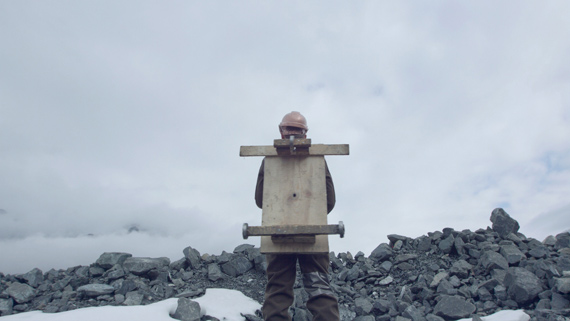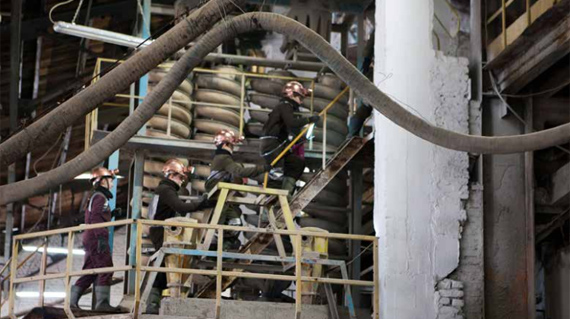
Driant Zeneli »
Maybe the cosmos is not so extraordinary
Exhibition: 11 May – 24 Nov 2019
Fri 10 May 14:30

The Ministry of Culture of the Republic of Albania has the pleasure to announce the participation of the Republic of Albania at the 58th Venice Biennale, with Maybe the cosmos is not so extraordinary, a project by artist Driant Zeneli, curated by Alicia Knock.
How do we push our physical and mental boundaries without becoming superheroes? Can the possible and the imaginary coexist? At the core of Driant Zeneli’s research is the redefinition of failure, utopia and dream. Through filmic narration and performance, Driant Zeneli questions human obsession with its own limits, sketching alternative responses to the fragility of human beings and planet earth. He challenges the physical and metaphysical relationship between man and space, matter and dream, gravity and control.
Maybe the cosmos is not so extraordinary (2019), is a sculptural video installation which expands upon a multidisciplinary project entitled Beneath a surface there is just another surface started in 2015 at Metallurgjik, a dystopian industrial complex, in the city of Elbasan, Albania. The project and its title derive from the pioneering science-fiction novel On the way to Epsilon Eridani (1983) by Albanian physicist and writer Arion Hysenbegas.
The installation develops from a two-channel film set in the mines of Bulqize, a city in the North-East of the country, where, since 1918, the chrome mineral has been extracted. Chrome represents a key resource for the industrial development of Albania and collides with economic and political conflicts in the Global South. The film stages a group of teenagers from Bulqize discovering a cosmic capsule which follows the journey of chrome, from its extraction and processing within the factory to its exportation and worldwide exploitation. This “geopolitical” space travel therefore turns this shady and dramatic industrial environment into an ambivalent space for collapse and takeoff.
Through binary storytelling, precise choreography of image and sound, the factory operates not only as an industrial space or geopolitical hub but as a visually performative force. The extraction of chrome is turned into a hypnotic sculptural image and the overall factory therefore translates into a big light and sound "parallel" installation, organically plugged into the walls of Arsenale. In this productive and immersive space, Driant Zeneli intends to create a tension between an oppressive underground reality and a utopian space of possibility and liberation.
Maybe the cosmos is not so extraordinary tries to physically reveal the ability of the ordinary, even in its darkest corners, to expand our existence.�
Driant Zeneli (1983, Shkoder, Albania), lives and works between Tirana and Milan. In 2008 he won the Onufri International Contemporary Art Prize, Tirana, in 2009 the Young European Artist Award Trieste Contemporanea and in 2017 MOROSO Prize, Italy. He was the artistic director of Mediterranea 18, the Young Artists Biennale from Europe and Mediterranean, taking place for the first time in 2017 between Tirana and Durres. He is co-founder of Harabel Contemporary Art Platform, Tirana. He has exhibited at: GAMeC, Museum of Modern and Contemporary Art, Bergamo, (2019); Passerelle, Centre d’Art Contemporain, Brest, (2018); Mostyn Gallery, Wales, UK (2017); MuCEM, Marseille, (2016); Academie de France à Roma, (2016); Centre Pompidou, Paris (2016); IV Bienal del Fin del Mundo, Chile (2015); GAM, Museum of Modern and Contemporary Art Turin (2013); White House Biennial, Athens (2013); KCCC, Klaipeda, Lithuania (2013); ZKM, Karlsruhe (2012); MUSAC, Castilla León. Spain,(2012); Prague Biennale 5, Prague (2011); Trongate 103, Glasgow (2011); National Gallery of Kosove, Prishtine (2010); Museo d’Arte Contemporanea Villa Croce, Genoa (2009); National Gallery of Tirana, (2008).
Alicia Knock, curator at Centre Pompidou in the Contemporary art and Prospective department created and run by Christine Macel, works at expanding the museum towards Africa and Central Europe, through both acquisitions and exhibitions. She explores new exhibition and working formats, questioning the museum itself through multidisciplinary projects (Harmony Korine, 2017). In charge of recent Duchamp Prize exhibitions (Kader Attia, Yto Barrada, Ulla von Brandenburg and Barthélémy Toguo, 2016; “The most foreign country,” women artists from the Duchamp Prize, Fondation Fernet Branca, 2017; Maja Bajevic, Joana Hadjithomas and Khalil Joreige, Charlotte Moth, Vittorio Santoro, 2017), she is also involved in the new project space of Pompidou, Galerie 0, aiming at becoming a laboratory for new practices (Museum On / Off, 2016).
Catalogue: Alicia Knock (ed.), Driant Zeneli. Maybe the cosmos is not so extraordinary, Mousse publishing, 2019, in English and Albanian. With more than twenty-five contributions by artists, scientists, writers and curators.
Instagram / Twitter / Facebook �